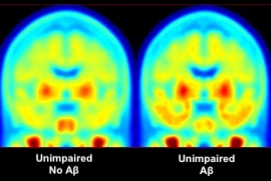In women undergoing menopausal transition, hormone therapy (HT) to replace waning endogenous levels of ovarian hormones can be highly effective in providing relief from symptoms such as hot flashes and night sweats, as well as protecting against bone density loss. Current guidelines recommend HT up to 10 years after age at menopause (defined as no menstrual period for 12 consecutive months). However, it is important for women and their physicians to discuss individual risk profiles and weigh them against the benefits to determine whether—and when—to initiate HT.
A recent study led by researchers at Massachusetts General/Brigham and Women’s Hospital, that included Cellular and Tissue Imaging Department Head Suzanne Baker as a collaborator, suggests that delayed initiation of HT is associated with poorer Alzheimer’s Disease (AD) related outcomes. The team found greater accumulation of tau—a biomarker for AD—in the brains of women over the age of 70 who took HT more than a decade prior.
The study, published in Science Advances, compared positron emission tomography (PET) imaging from 73 cognitively unimpaired women (aged 51 to 89 at the outset) who had used hormone therapy an average of 14 years prior with 73 age-matched, cognitively unimpaired women who had not. Participants had PET scans for tau over a 3.5-year period and for amyloid beta over a mean 4.5-year period.
The researchers did not see a statistically significant difference in amyloid beta accumulation—also a hallmark of AD—between the two groups. Nor did they observe a difference in tau accumulation in women younger than 70. However, it takes approximately 20 years for amyloid to accumulate before tau starts to spread throughout the brain leading to cognitive impairment. This makes midlife a critical period for future brain health.
“This paper points to menopause transition and use of hormone replacement therapy as an area of research that needs to be explored to better understand the trajectory of women’s brain health into later life,” said Baker, noting that women have an almost twofold higher incidence of AD compared to men.
“[Natural] hormone cessation during menopause and the use of hormone replacement therapy—which appears to impact later life amyloid and tau accumulation—could inform the questions we ask as to why women are more susceptible to Alzheimer’s disease.”
Read more from Massachusetts General/Brigham and Women’s Hospital.




